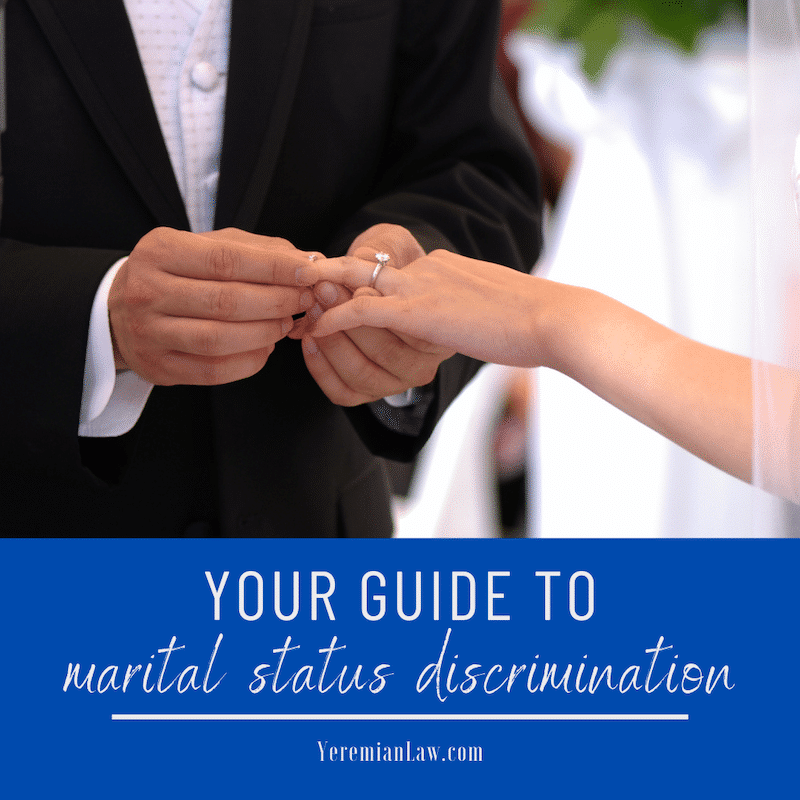Can an employer choose not to hire you because you’re single or fire you because you’re married? The answer to both of those questions is no – that’s considered marital status discrimination. This guide explains marital status discrimination and what you can do if you’ve been a victim of it.
What is Marital Status Discrimination?
Marital status discrimination occurs when an employer discriminates against you because you are – or because you aren’t – married. Though federal law doesn’t protect people against marital status discrimination, California law does.
California law (specifically the Fair Employment and Housing Act, or FEHA) prohibits employers from discriminating against you based on your marital status. Employers may not, based on your marital status:
- Refuse to hire you
- Fire you or lay you off
- Discriminate against you when it comes to terms, conditions or privileges of employment
- Refuse to choose you for a training program
- Fail to give you the same benefits that other employees get
Related: Questions employers can’t ask you during job interviews
What Relationships Count for Marital Status Discrimination?
For discrimination law purposes, employers can’t discriminate against you because you’re:
- Married
- Single
- Divorced or had a marriage annulled
- Married to a same-sex partner
- Engaged
- Separated from your spouse
- In the process of divorcing your spouse
- Widowed
- Planning to eventually get married
- Planning to never get married
Related: What can you do about sexual orientation discrimination?
Your marital status or future plans for marriage are none of your employer’s business. In fact, employers aren’t even allowed to ask you whether you’re married during a job interview (neither in person nor on a job application). That means employers aren’t allowed to ask you what your maiden name was (though they can ask you for names you’ve had in the past for purposes of a background investigation).
Employers can’t ask you the question in a roundabout way, either, such as by asking your spouse’s name, occupation or age.
Sometimes employers make these questions seem like part of everyday conversation. For example, an interviewer who spots your engagement ring may say, “Oh – you’re engaged? Congratulations! When’s your wedding?” Even if the interviewer didn’t mean anything by it and wouldn’t discriminate against you based on your marital status, they shouldn’t ask that type of question. If the interviewer believes that you’ll have to miss work for your honeymoon or have kids in the future and fails to hire you because of it, it may have been discriminatory and unlawful to ask the question in the first place.
Related: Can your employer require proof of COVID-19 vaccination?
How Can You Tell if You’ve Been Discriminated Against Based on Your Marital Status?
It can be tough to tell if an employer has discriminated against you based on your marital status. However, you may have been discriminated against if an employer:
- Demoted you
- Denied you a promotion or benefits
- Fired you
- Forced you to quit
- Harassed you
- Paid you less than others who are equally qualified but in a different marital status
- Refused to choose you to participate in a training program
- Refused to hire you
If other employees who are in a different marital status than you receive different treatment, it may indicate that your employer is discriminating against you. For example, if an employer frequently asks you to work on holidays because other employees have families, it may be discriminating against you due to your unmarried or single status. Employers are not allowed to make your working conditions different from those of your coworkers based on your marital status.
Related: Transgender discrimination in the workplace
Can You Sue an Employer for Marital Status Discrimination?
You may be entitled to sue your employer over marital status discrimination. However, you and your attorney must prove that your employer did, in fact, discriminate against you due to your marital status. That means you’ll most likely need some type of documentation that proves your employer treated you differently from employees with a different marital status than yours.
Related: Can I sue for…?
Do You Need to Talk to an Attorney About Marital Status Discrimination?
The best way to find out whether you have grounds to sue your employer for marital status discrimination is to schedule a free consultation with an experienced workplace discrimination attorney in Los Angeles.
Call our office at 818-230-8380 or fill out the form below to schedule your free consultation. Tell us why you believe your employer (or a potential employer) discriminated against you based on your marital status; we’ll ask you some questions and give you the legal guidance you need to start moving forward.





